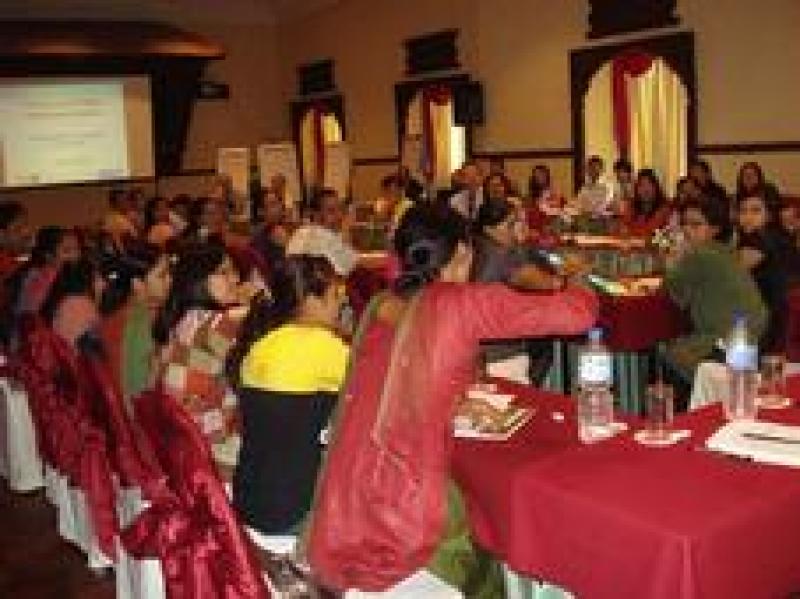

Kathmandu, A lesson-learnt workshop on the PBF/UNPFN-funded UNICEF/UNFPA project “Ensuring recognition of sexual violence as a tool of conflict in the Nepal peace building process through documentation and provision of comprehensive services to women and girl victims/survivors” was organized in Kathmandu on 4 and 5 August 2011. The workshop reviewed the progress made so far and shared lessons, challenges and good practices in order to improve project implementation.
Kathmandu, 5 Aug 2011: A lesson-learnt workshop on the project “Ensuring recognition of sexual violence as a tool of conflict in the Nepal peace building process through documentation and provision of comprehensive services to women and girl victims/survivors” was organized in Kathmandu on 4 and 5 August 2011. The workshop reviewed the progress made so far and shared lessons, challenges and good practices in order to improve project implementation. The two-year project, which was initiated in April 2010, is being jointly implemented by UNICEF and UNFPA and is being funded from the Peacebuilding Fund (PBF) contribution to Nepal, through the UN Peace Fund for Nepal (UNPFN).
The objective of the project is to ensure recognition of sexual violence as a tool of conflict in the Nepal peace building process through the documentation and provision of comprehensive services to women and girl survivors.
In Nepal’s decade long armed conflict which, ended in 2006, women and girls experienced sexual violence perpetrated by both sides: Government security forces and the Maoist Army. Although many other forms of human rights violation have been documented, information on the use of sexual violence as a tool of conflict has been scarce. As a result, the incidents of sexual violence have not been officially recognized by the Government (sexual violence survivors are among two categories of victims who are not included as beneficiaries of the Government Interim Relief and Rehabilitation programme), and survivors remain silent and continue to suffer from physical and psychological effect of the violence. Survivors of sexual violence often face severe stigmatization. There is a strong culture of silence and a sense of shame, which prevents victims from speaking up. The Project aims at ensuring access to justice for survivors and promoting the issue of sexual violence to be addressed in transitional justice mechanisms.
To-date, over 20,000 women and girls have benefitted from mobile reproductive health camps in 14 of the most conflict affected districts of the country through the project. The project operates in a unique way to document cases of sexual and gender based violence, using reproductive health camps for women and girls as the entry point to potential survivors. These camps offer an environment where confidentiality and safety are ensured and survivors can access psycho-social and legal counseling services in addition to medical services. Over 80 cases of conflict related sexual violence have been documented so far, which will be submitted to the Truth and Reconciliation Commission once it is established.
The lesson-learnt workshop highlighted various issues. There is a need for better coordination with local stakeholders, and this can be done through engaging them in the camp implementation, such as providing capacity building, including a range of government line offices and civil society organizations in a camp management committee and mobilizing their affiliates and volunteers in the camps. It is also important to ensure hand-over of cases to follow up and provide services if locally available. It was also acknowledged that linkage with the peace process should be strengthened and justice and relief need to be ensured for the survivors. Mobile camps will run until February 2012.
Some of the major lessons learnt from the project include:
The project team developed a strategy to deal with challenges identified in the workshop. Crucially within this strategy, the project will advocate for the inclusion of sexual violence survivors in the Government Interim Relief and Rehabilitation programme as well as in the future Reparations Policy. The Project contributes to the National Action Plan on implementation of the UNSCR 1325 and 1820, particularly in protection, relief and recovery areas.
The MPTF Office-administered UNPFN was established in 2007 to mobilize resources to the UN system in Nepal in support of activities of strategic relevance to the peace process in the country. The UNPFN is supported by the Governments of Canada, Denmark, Norway, Switzerland and the United Kingdom, in addition to a Peacebuilding Fund country envelope that is channelled through the UNPFN mechanism. The UNPFN supports activities under five main priority areas: i) Cantonments/Reintegration; ii) Elections/Governance; iii) Recovery/Quick Impact Projects; iv) Security; and v) Rights and Reconciliation.
Additional information on the UNPFN is available here.
[1] WHO Ethical and Safety Recommendations for Researching, Documenting and Monitoring Sexual Violence in Emergencies, World Health Organization, 2007